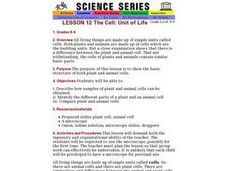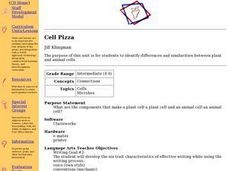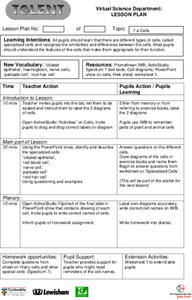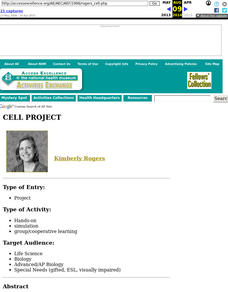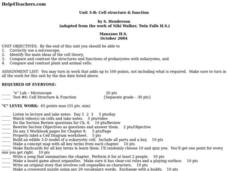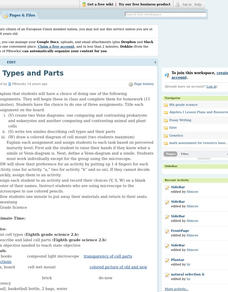Curated OER
Cell 7 Plant v Animal Cells
Students differentiate between plant and animal cells. They identify the structures central to plant cells. They complete a Venn Diagram listing the differences between animal and plant cells.
Curated OER
Plasmolysis in Elodea Plant Cells
High schoolers microscopically observe various subcellular components. They determine the effects of different salt solutions on Elodea plant cells. Students explain the major function of a cell membrane and describe its structure.
Curated OER
Cells, Cells, Cells
Students explore plant and animal cells. Using household items, students create a three-dimensional model of a plant or animal cell. Students identify and label each cell part.
Curated OER
Cell Study
Students (females) are introduced to the cell. They discuss what a cell is, and students define what a cell is. Students comprehend that all living things are made up of cells. They comprehend that life is defined as something that...
Curated OER
Cells: Nature's Building Blocks
What you will find on this page is the general outline of a unit on the use of a microscope and the structure of the cell. There is no actual educational content here, so you will need to design the details of each of the four student...
Curated OER
The Cell: Unit of Life
Pupils identify the parts of plant and animal cells, how samples can be obtained and what the differences are.
Curated OER
Cells
Learners research both plant and animal cell characteristics. They draw the parts of each cell and as groups present their research.
Curated OER
Cells are 3-D!
Students design three dimensional models of plant and animal cells. They identify the cells parts, and compare animal and plant cells.
Curated OER
Cell Organelles
Students explore biology by researching living cells. In this living organism lesson, students participate in a role-playing activity in which all the students in class form one plant cell by portraying specific parts of a cell. Students...
Curated OER
Cell Pizza
Students identify parts and functions of microscope. Students watch video, Cells and Life about cell parts with actual pictures and actual cells. Students discuss video and identify parts of the cells that animals and plants have in...
Curated OER
Cells
Students explore the types of cells and their appropriate function. After observing a PowerPoint presentation, students draw diagrams of cells. Using a specified website, students identify parts of plant and animal cells. They answer...
Curated OER
Those Cells Look Good Enough to Eat
Pupils explore the parts of the cell. In this cell lesson plan, students use foods to create cell models that represent the nucleus, cytoplasm, cell membrane, mitochondria, ribosomes, vacuoles, endoplasmic reticulum, and Golgi bodies...
Serendip
Introduction to Osmosis
A chicken egg is a very large cell—perfect for investigating osmosis! Scholars conduct an experiment with vinegar and eggs that helps them understand the process of osmosis. They follow the activity with an in-depth look at osmosis...
Curated OER
Parts of the Flower and Pollination
Students review the parts of the plant and recognize the parts that are important for pollination. In this pollination lesson, students illustrate and label the parts of a flower. Students compare different types of flowers.
Curated OER
Cells
Young scholars explore the cell and cell processes. They create "cytoplasm", make a model of the cell and its organelles, and simulate the osmosis and the diffusion of materials into and out of the cell.
Curated OER
Cell Project
Students investigate cells. They discover what cells are, where they are found, what they do and what they are made of. They construct a giant cell that is posted on the bulletin board.
Curated OER
Photosynthesis and Cell Respiration
Fifth graders participate in scientific inquires regarding the concepts of photosynthesis and cell respiration. In this photosynthesis and cell respiration instructional activity, 5th graders describe the process of photosynthesis with...
Curated OER
Cell Structure and Function
Students identify the main ideas of different cell theories. Using a microscope, they compare and contrast the structures and functions of prokaryotes and eukaryotes. They also compare and contrast animal and plant cells and complete...
Curated OER
Lesson 2: the Cell Cycle
Young scholars explain how cells reproduce. In this biology lesson, students explain the different stages of the cell cycle. They calculate the number of new cells produced.
Curated OER
Plant Cell Coloring
Students study a plant cell and its parts. In this cell organelle lesson students are to label parts of a plant cell and color them.
Nuffield Foundation
Observing Water Moving Through Plants
We know plants assist in the water cycle, but how do plants get water from the ground into the air? Through a series of demonstrations or labs, scholars observe the movement of water through plants. They microscopically view the cells...
Curated OER
Benefits of Indoor Plants
Students diagram a plant. In this Science lesson, students explore the concept of photosynthesis focusing on the oxygen production. Students calculate the amount of plants needed to filter the air in their classroom.
Curated OER
WHAT IS A CELL?
Students explore the function and structures of cells, including plant and animal cells. They explore cell parts including cell wall, ribosomes, chromosomes, nucleoid, plasmids, flagella, pilli, and plasma membrane, cel
Curated OER
Cells And Their Parts
High schoolers investigate different types and their parts. They differentiate prokaryote and eukaryote cells and create a venn diagram displaying differences or similarities. Students write ten similes related to the cells and parts of...





